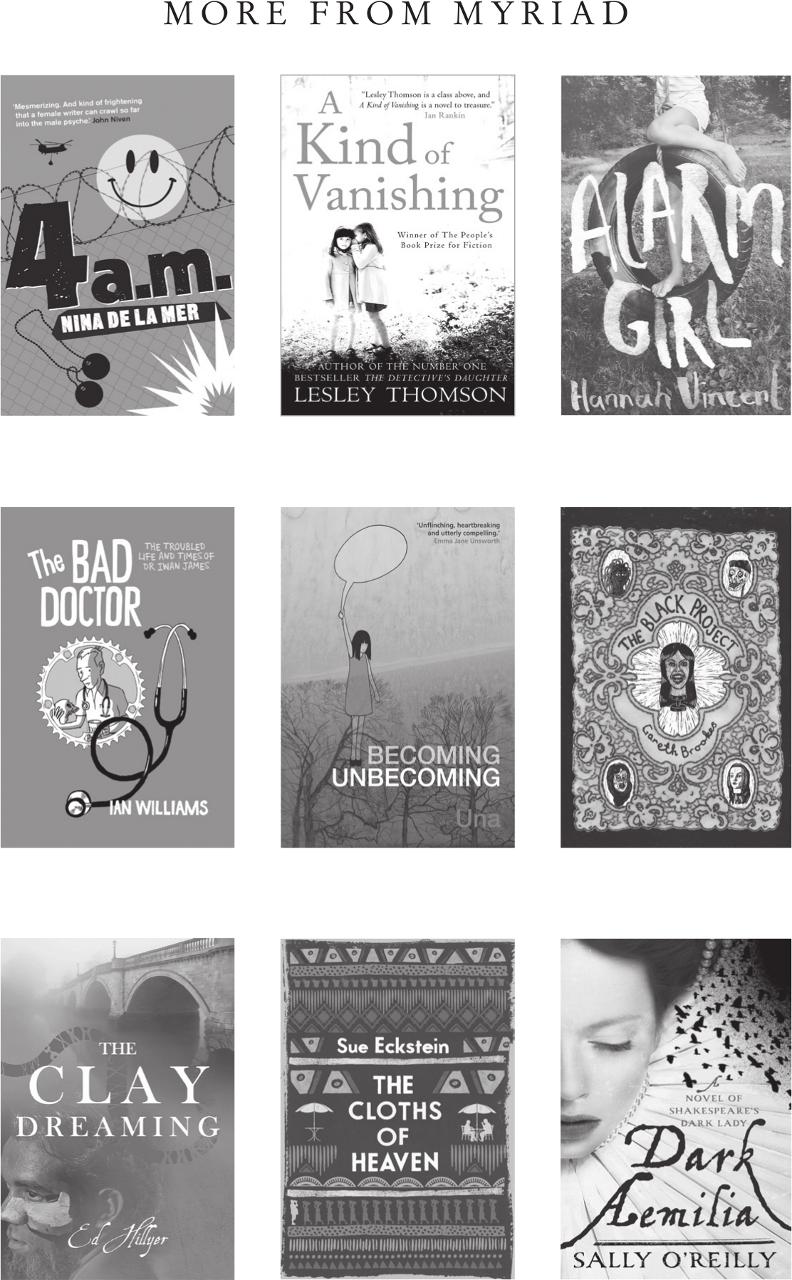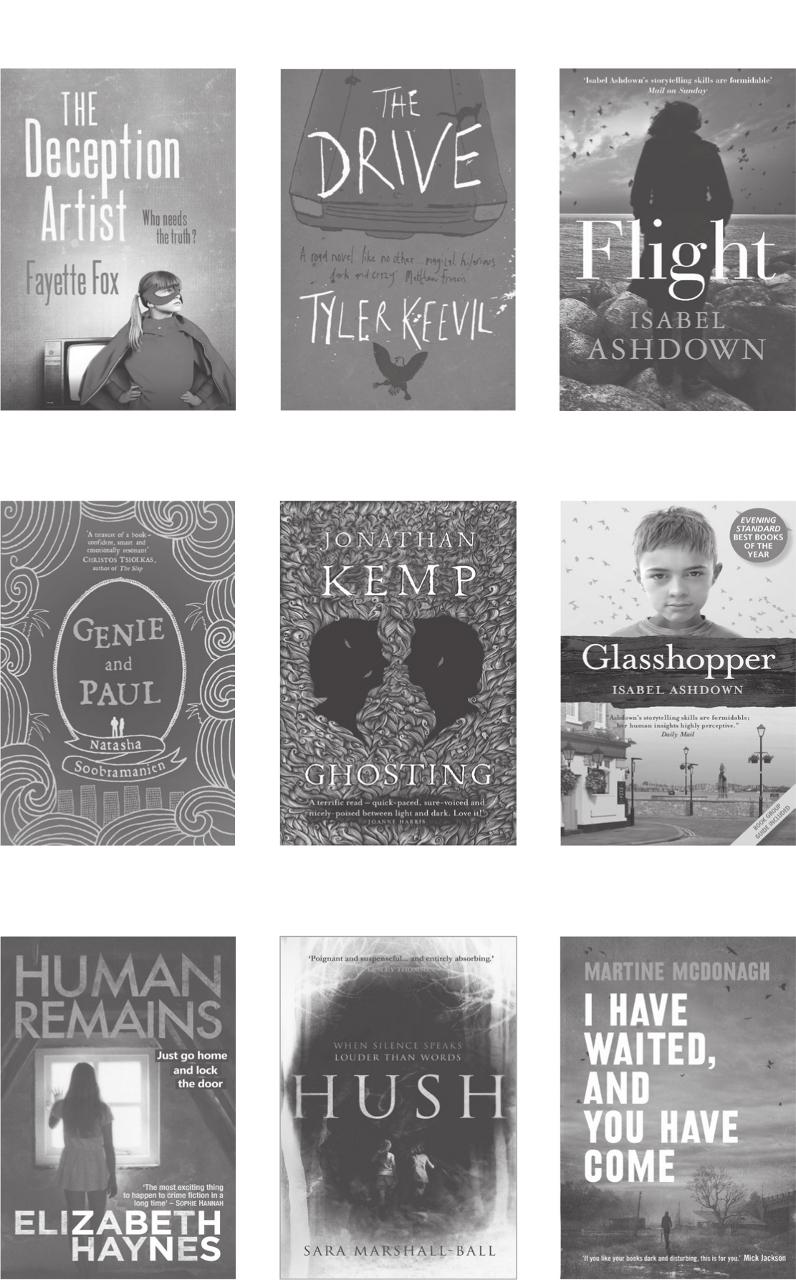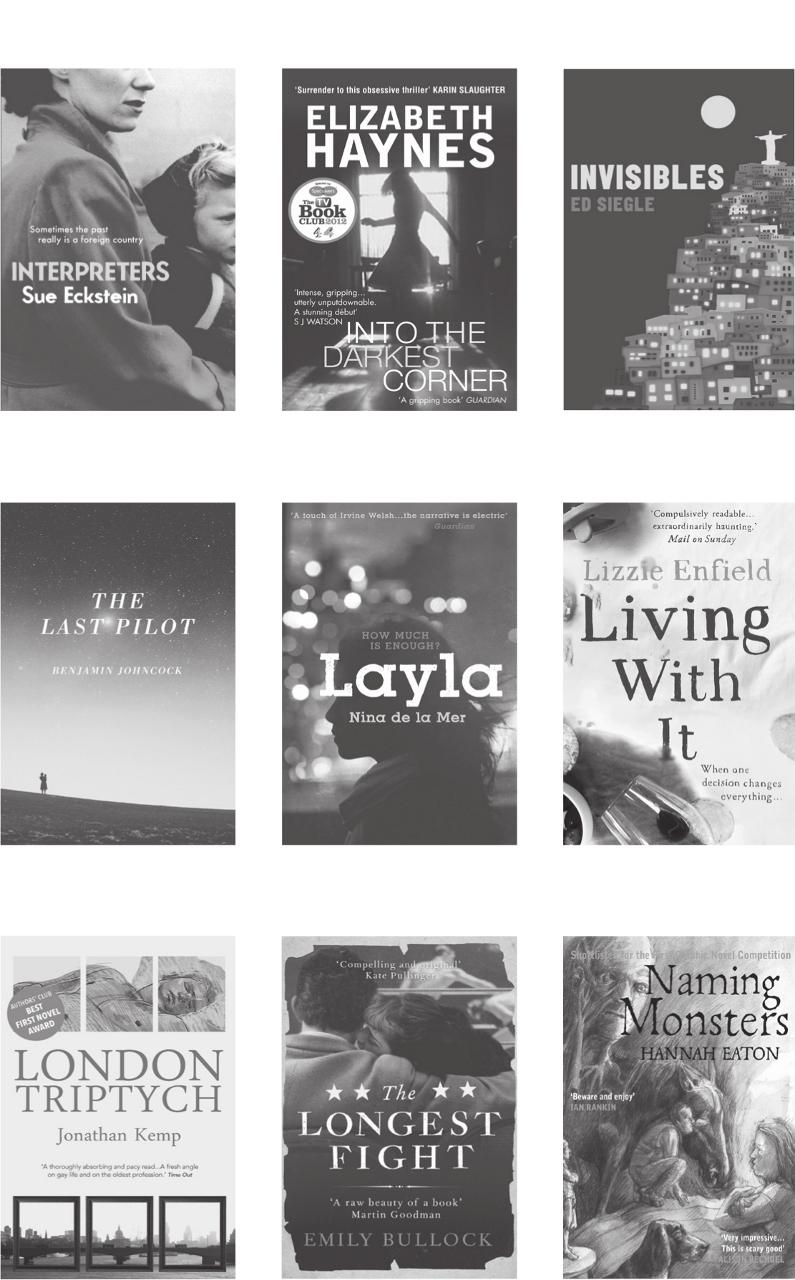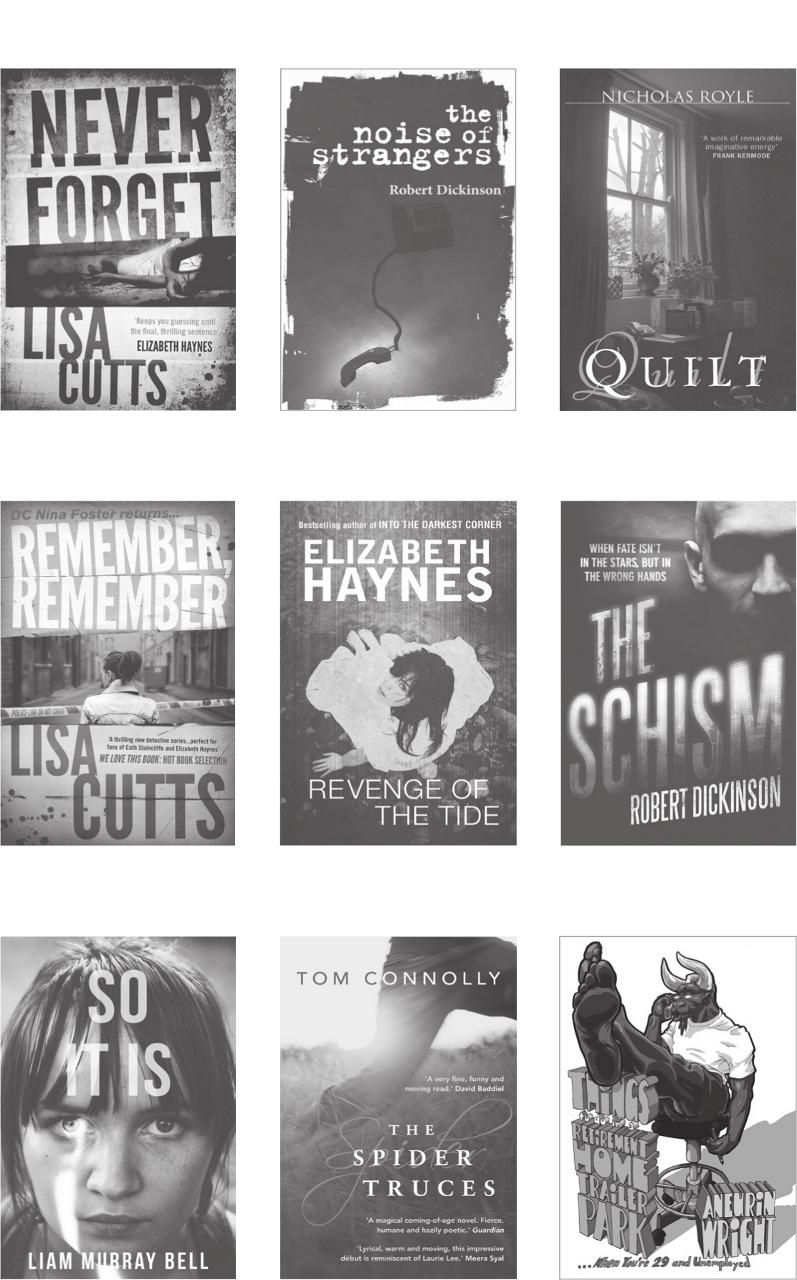How You See Me (19 page)
Authors: S.E. Craythorne

Daniel
30th April
The Studio
Dear Dad –
You’ll probably never read this letter. You’re in hospital. They’ve warned me you’re not likely to return. It seems I’ve let you down. It’s strange here. Maggie took Tatty away, so it’s just me and the walls.
Mab wrote to me at last. She might be there with you on the ward now. She told me not to write to Freya any more. I’ve only sent silly little letters to her from Tatty. Well, you know all about them; you watched me write them. I knew she would love that dog. I am not to contact Mab either. The women have closed me off and left me behind.
I can’t return to Manchester. It doesn’t seem right while you’re still here. Alive, if not kicking. That’s more or less what the nurse told me over the phone. I pretended to be your nephew; I wasn’t sure whether they’d let me know anything if I gave my real name. I am too disgraceful to deserve any information.
There is too much light. I’ve drawn the curtains, but it creeps through and squats on the rug. Impossible to ignore. It’s this damn spring, bringing more hours of daylight every day. I am much happier in a gloom, both figurative and literal. I wait until dark before leaving the house. Thank goodness for the late-night shop under the bridge. And the bored exchange of girls behind the counter. That’s where I get the papers. I suppose I should ignore them – it was inevitable that someone would pick up the story – but I don’t see why they had to drag your name into it. None of them is above the intrusion. There’s this from the local rag:
The son of famous artist Michael Laird was arrested earlier this month following his father’s triumphant comeback exhibition.
Charges of rape and harassment were levelled at Daniel Laird following complaints from an unnamed source. Sources suggest that these alleged crimes took place in Greater Manchester, in which area he had previously resided. Thanks to publicity for his father’s PORTRAITS showcase, police were able to track Laird and conduct the arrest.
Laird, since released on bail, was born and schooled in Upchurch. He was described by Mr J. Hunting of Upchurch High School as a ‘large, awkward boy’ who ‘kept himself to himself’. Not much is known of his movements since his return to the area, though rumours suggest that several other women have come forward since Laird’s arrest was made public.
The Laird family are keen to distance themselves from possible scandal. Michael Laird was too unwell to comment, but Mabel Laird (the artist’s daughter from his first marriage) pleaded for ‘privacy at this difficult time’.
Nice to hear that things are difficult for Mab. No real mention of what it’s like to play the monster of the piece. Well, it’s not much fun, let me tell you. And the picture they included is far from flattering. I suppose they could have
used one of your portraits of me. One should be grateful for small mercies.
I’m drinking too much. I’m finishing off what’s left of the whisky. And I don’t have your excuse. I’m perfectly aware of my actions. I know how tragic my situation is. In fact, I’m even guilty of enjoying it. I can see it as the opening scene of a movie: the camera panning from the drawn curtains to the man in his chair. A glass by his side, smeared with greasy fingerprints. The man is unshaven and his clothing creased. When he’s not writing on the pad of paper in front of him, he stares forward and his lips move. The changes of expression suggest he’s rehearsing some conversation. Some argument he cannot win. I’ve dabbled with the idea of a soundtrack, maybe something classical and baroque, but I don’t think it’s necessary. The set-up is clichéd enough without music. Let the viewer struggle to make out what the man is saying and what he is writing. Let them be content with the small shuffle of pen and cuff against paper.
Not much of a beginning, but I must be content with the cards I have been dealt. I have to make the best of things, isn’t that what Maggie would say? Do you know what she left me, as a house-leaving gift, when she came to get Tatty. A cyclamen. It’s sitting next to me now. Dark red blooms with sharp waxy leaves, balanced on an open hand of rounded stems. I considered using it as an ashtray, but I couldn’t bring myself to stub out my cigarette in the soil. It will die soon, I’m sure – there’s not enough light in here – but for the moment it is healthy and fresh. I’ve even watered it a couple of times on my way back from the bathroom. An unlikely pool of life in this dour room, and my only companion.
Maybe a plant is a safer pet for me than Tatty, but I miss the excuse to take a walk. There is nothing more anonymous than a man with a dog. I miss you too, of course, but Maggie was right. I wasn’t taking care of either of you in the right way. I must learn to accept my punishment. It may not be long until they put me back in a prison cell. I suppose I should get used to solitary.
The new complaints to the police. They haven’t told me, but it has become pretty clear where they’re coming from. Another gift from Maggie was to give me Sarah’s name. The betrayal was overwhelming. To claim that our night together all those years ago was anything but the fulfilment of both our desires. And to think she carried such hatred and bitterness towards me. I am so stupid. When I first came back here, it was you I was afraid of, but, all the while, lies were breeding in the minds of those I thought to love. Despite all my research and work, I played the game wrong. Another punishment to shoulder.
Mab was very strange in her letter. There was more written there than the simple order against contact. She managed to destroy not only our future relationship, but our history as well. I don’t understand any of it. She said that she was forced to go into league with Aubrey to get rid of me when I turned up in Corsica. She even claimed to have paid him to keep me ‘safe’ – whatever that means. Now he’s proved himself unable to complete that one task, their understanding is at an end. According to Mab, I don’t have a job to go back to. And I don’t have her to run to. I have nowhere else to be. Nowhere else where I am welcome. This room is my only refuge. So I must sit in it alone and learn to be grateful.
(Later)
I walked to the shop under the bridge. The girl behind the counter smiled at me and said hello as I walked in. Obviously not a big reader. I just went in to pick up a couple of TV dinners; I had to ask for the bottle of whisky.
‘Big night?’
‘I’m sorry?’
‘It was a joke. A bad joke.’
They were the first words I’d spoken aloud for five days.
I’m sorry.
And I’d chosen to share them with the girl with the bad haircut and bitten nails who was scanning my macaroni cheese. Maybe I should settle down with her, I thought. Maybe if I could just make her smile again, then we could start to chat and she could tell me about her family and her troubles. We could hold hands over the counter. Exchange chaste kisses while people browsed for their breakfast cereal and emergency pints of milk, separating only when they came to the till. They’d smile on us – the passing custom – and think us oh so sweet. I’d bring her presents. Maybe some kind of capsicum pepper solution to paint her nails with. Thoughtful things, wrapped up in bright paper.
‘I just love to watch your face when you open them,’ I’d say.
‘You shouldn’t spoil me.’
But I would spoil her. I’d bring her chocolates and homemade peppermint creams – to keep her blood sugar up on the long night-shift. On our weekly anniversary, I’d play at being the customer and she’d tell her joke and I’d laugh and give her red roses, one for every day I’d known her. It would be beautiful.
This was what I was thinking as I walked home in the dark. I was forgetting to keep to my urban fox route, in the shadows. And that was when I met Maggie. She tried to ignore me at first, I think. But I called out to her and asked her how you were doing.
‘He broke his hip. He’s still in the hospital, what do you think? And where you should be, if anybody thought to ask me, is by his bedside like a proper son. You need to start acting right, Danny. You should be ashamed of yourself.’
‘Mab won’t let me be there.’
‘And when have you ever listened to that sister of yours? And whose fault is it that the poor man is in that bed in the first place? When I think of what you put him through, with me round the corner and just a phone call away. Sweet Jesus, I’m so angry I can’t even look at you.
‘And here you are. Look at the state of you. You look and smell like you’ve slept in those clothes. And you are not one of those men who can wear a beard. I’ve told you. Is that what you’ve been doing back there, wallowing in self-pity? Well, I tell you, there are more people out there deserving of your pity and some of them not so far away.’
They say:
I didn’t take care of you.
It was my fault you fell.
Without Tatty’s bark and howl, they would never have known you lay on the bathroom floor. The neighbour would never have found you with your face pressed against the break in the lino, your breath shallow and faint. You were still trying to pull the pair of clean dress trousers over the
split catheter bag, over your shattered hip. I don’t know where you could have found them.
They found empty bottles around the bottom of my chair and no food in the fridge.
No one could wake me – not even the ambulance men – to tell me what had happened to you. When they tried, I got abusive. They left me a note and let me sleep it off.
There were marks on your body. Cuts, abrasions, bruises and sores. There was a dark, angry rash on your lower leg where the urine had soaked into your skin.
They had to cut Tatty’s fur to get the filth out. Special solvent and special food had to be bought to get her back to her normal self.
I should be prosecuted.
I should be in prison.
You wouldn’t treat a dog that way.
I shouldn’t have treated a dog that way.
I say:
I seem to have lost myself somewhere in everyone else’s opinion.
I have only ever tried to do my best. To be the best man I could be. The best son, the best brother, the best lover, the best friend. I have never managed to be the best at anything.
I misjudged you. You were the one I should have turned to. You were the only one who could have understood me.
I lose everything that I love.
I’m writing this letter to you, but you’ll never read it. I’ve run out of readers.
I’m sure they’ll arrest me in the morning and I only owe one person an apology. I have only done one thing wrong.
I’m sorry, Dad.
With thanks to all those who read and encouraged me through early drafts, in particular David Hill, Elspeth Latimer, Hayley Webster, Tom Corbett, Sarah Butler and Alice Kuipers. Thanks are due to Writers’ Centre Norwich for their support and care. Also, to the Literary Consultancy and their Free Read scheme. And Syd Moore, Colette Bailey and all at METAL Southend, who gave me fresh perspective and helped me find the right ending.
This novel found publication through the Myriad Writer’s Retreat Competition. I must thank Candida Lacey and Pam McIlroy (
aka
Pamreader) for belief in the book and their continued kindness to its author. To all at Myriad Editions for their tireless work and support, but, most of all, thanks to Holly Ainley, editor and friend, for reading it and reading it and always believing in it.
Finally, thank you to my family: to Mum, Heidi and John, to whom this book is dedicated, for saving me and loving me and reading pages even when you really didn’t want to. And to David, Mary and Alice, the loves of my life, for showing me a happiness I didn’t know existed when I started this book.
S.E. Craythorne lives and works in rural Norfolk. She holds an MA in Creative Writing from the University of East Anglia and her poetry and prose have been published in various literary journals.
How You See Me
is her first novel.
First edition published in 2015
This ebook edition published in 2015 by
Myriad Editions
59 Lansdowne Place
Brighton BN3 1FL
Copyright © S.E. Craythorne 2015
The moral right of the author has been asserted
All rights reserved. No part of this publication may be reproduced, stored in a retrieval system, or transmitted in any form or by any means without the written permission of the publisher, nor be otherwise circulated in any form of binding or cover other than that in which it is published and without a similar condition being imposed on the subsequent purchaser
A CIP catalogue record for this book
is available from the British Library
ISBN (pbk): 978-1-908434-56-2
ISBN (ebk): 978-1-908434-57-9
Designed and typeset in Palatino
by Linda McQueen, London




